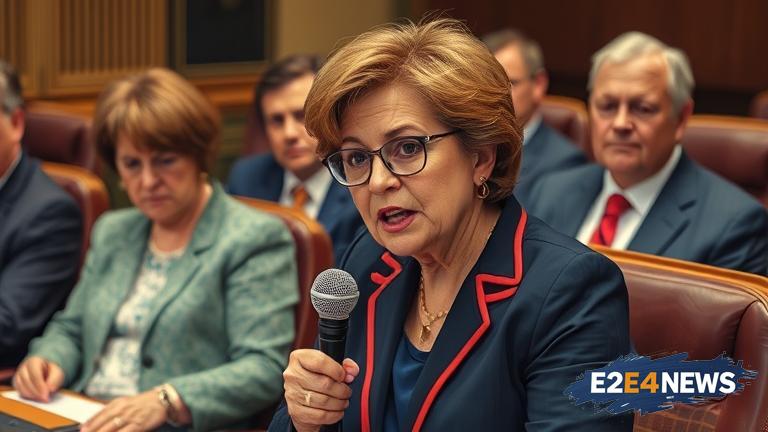Pauline Hanson, the leader of One Nation, has announced plans to introduce an urgency motion in the Australian Senate, which will put pressure on Coalition senators to make a decision on the government’s net-zero emissions target. The motion is expected to be debated in the Senate, where Hanson will argue that the government’s plan to reach net-zero emissions by 2050 is unrealistic and will have devastating consequences for the Australian economy. Hanson has stated that she will not support the government’s plan, citing concerns over the impact on jobs, particularly in the coal and mining industries. The urgency motion will force Coalition senators to make a decision on the matter, and if they don’t comply, they will be branded as cowards. The move is seen as a strategic play by Hanson to put pressure on the government and to gain support from voters who are concerned about the impact of climate change policies on the economy. The Australian government has committed to reducing greenhouse gas emissions to net-zero by 2050, in line with the Paris Agreement. However, the plan has been met with criticism from some quarters, with concerns over the cost and feasibility of the transition to a low-carbon economy. The Coalition government has argued that the plan will create jobs and stimulate economic growth, but Hanson and other critics argue that it will lead to significant job losses and economic disruption. The debate over climate change and energy policy has been a contentious issue in Australian politics, with different parties and stakeholders holding strongly opposing views. The introduction of the urgency motion is likely to reignite the debate and put pressure on the government to reconsider its plans. The Australian Senate is expected to debate the motion in the coming days, with Hanson and other senators set to argue their positions on the matter. The outcome of the debate is uncertain, but it is likely to have significant implications for the government’s climate change policy and the future of the Australian economy. The move by Hanson has been seen as a challenge to the government’s authority, and it will be interesting to see how the Coalition senators respond to the pressure. The Australian public will be watching the debate closely, as the outcome will have significant implications for the country’s energy policy and the future of the economy. The government has argued that the transition to a low-carbon economy is necessary to reduce greenhouse gas emissions and mitigate the impacts of climate change. However, critics argue that the plan is too ambitious and will have significant economic costs. The debate over climate change policy is complex and multifaceted, with different stakeholders holding strongly opposing views. The introduction of the urgency motion is likely to add to the complexity of the debate and put pressure on the government to reconsider its plans. The Australian government has committed to reducing greenhouse gas emissions by 26-28% below 2005 levels by 2030, as part of its commitment to the Paris Agreement. However, the plan to reach net-zero emissions by 2050 is a more ambitious target, and it is unclear whether it is achievable. The government has argued that the plan will create jobs and stimulate economic growth, but critics argue that it will lead to significant job losses and economic disruption. The debate over climate change policy is likely to continue in the coming days and weeks, as the Australian Senate debates the urgency motion and the government’s plan to reach net-zero emissions by 2050. The outcome of the debate will have significant implications for the future of the Australian economy and the country’s energy policy. The Australian public will be watching the debate closely, as the outcome will have significant implications for the country’s future. The government’s plan to reach net-zero emissions by 2050 is a complex and multifaceted issue, with different stakeholders holding strongly opposing views. The introduction of the urgency motion is likely to add to the complexity of the debate and put pressure on the government to reconsider its plans. The Australian Senate is expected to debate the motion in the coming days, with Hanson and other senators set to argue their positions on the matter. The outcome of the debate is uncertain, but it is likely to have significant implications for the government’s climate change policy and the future of the Australian economy.
